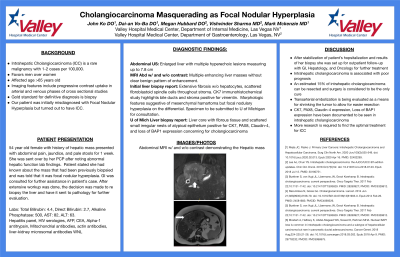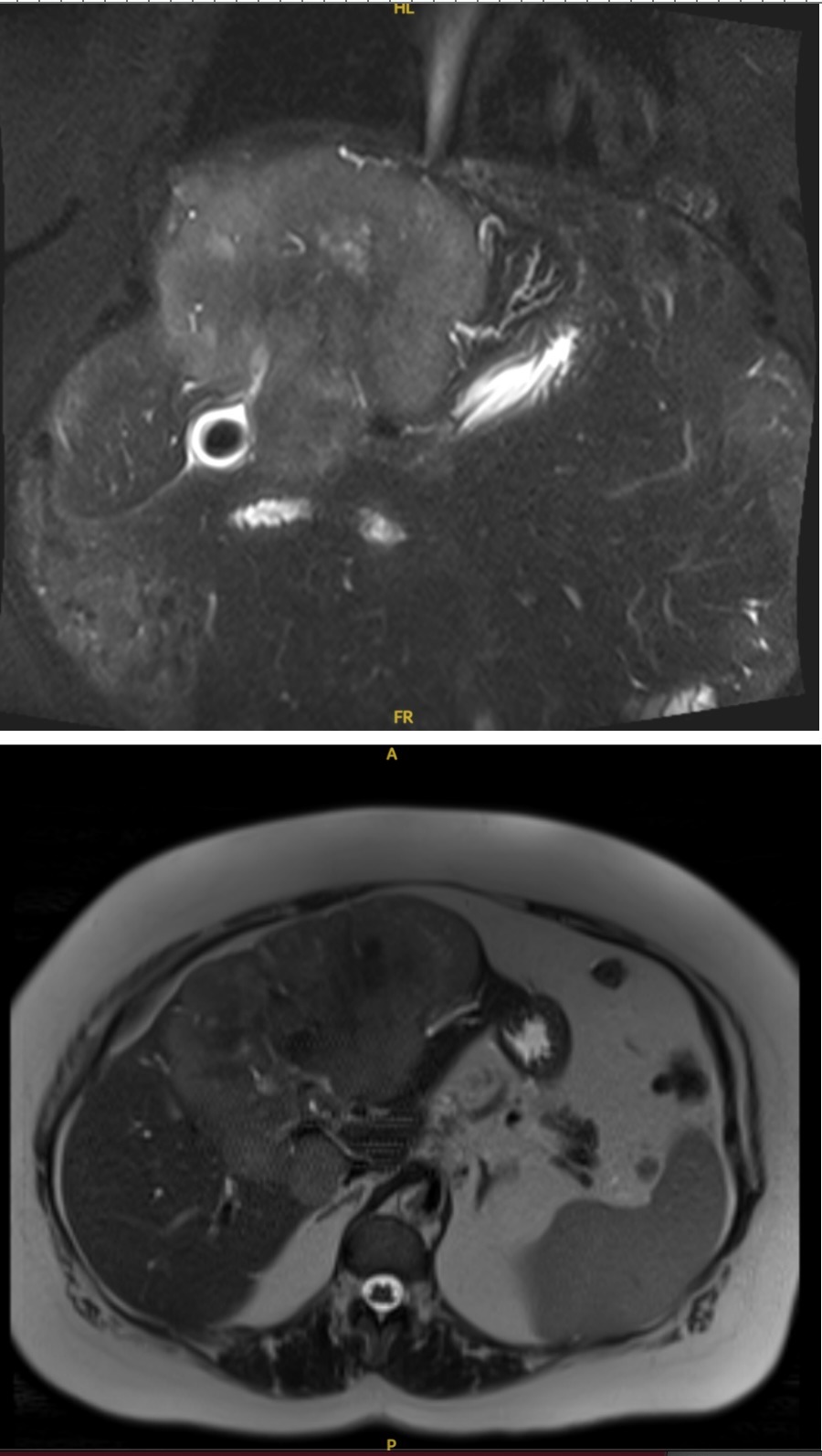Tuesday Poster Session
Category: Liver
P4849 - Cholangiocarcinoma Masquerading as Focal Nodular Hyperplasia
Tuesday, October 29, 2024
10:30 AM - 4:00 PM ET
Location: Exhibit Hall E

Has Audio

John Ko, DO
Valley Hospital Medical Center
Las Vegas, NV
Presenting Author(s)
John Ko, DO, Dai-an Vo-Ba, DO, Megan Hubbard, DO, Vishvinder Sharma, MD, Mark Mckenzie, MD
Valley Hospital Medical Center, Las Vegas, NV
Introduction: Intrahepatic Cholangiocarcinoma (ICC) is considered to be a rare malignancy with approximately 1-2 cases per 100,000 and men are more favored than women. In addition, the average patient affected by this cancer will usually be over 65 years old. Typical imaging features will include progressive contrast uptake in both arterial and venous phases of a cross-sectional study but definitive diagnosis will require liver biopsy. We present an unusual case of an adult patient with ICC that was initially misdiagnosed as Focal Nodular Hyperplasia.
Case Description/Methods: 54-year-old female with history of hepatic mass presented for abdominal pain, jaundice, and pale stools for one week. The patient reported that she had a known history of a hepatic mass that had been previously biopsied and diagnosed as focal nodular hyperplasia (FNH). Initial labs were notable for total bilirubin 4.4 mg/dL, direct bilirubin 2.7 mg/dL, alkaline phosphatase 500 U/L, aspartate aminotransferase (AST) 82 U/L and alanine transaminase (ALT) 63 U/L. Viral serologies, autoimmune and tumor markers returned negative.
Abdominal ultrasound showed hepatomegaly secondary to multiple hyperechoic lesions and a doppler was performed that was normal. MRI abdomen with hepatic protocol multiple lesions with the largest lesion measured at 15.9 x 11.1 cm with peripheral hyperenhancement and central hypoenhancement on the arterial phase imaging. MRCP was ordered but returned unremarkable. Repeat liver biopsies were obtained and sent for review. The initial pathology report came back indeterminate and the samples were sent to University of Michigan for a second opinion. The sample staining was positive for CK7, Pax8, Claudin-4, and had loss of BAP1 expression. Given these findings, suspicions were raised for cholangiocarcinoma and the patient had subsequent follow up with GI, Hepatology and Oncology.
Discussion: Intrahepatic cholangiocarcinoma is a cancer that presents with an overall poor prognosis. It is estimated that 15% of patients have a disease burden that is resectable. Median survival is reported to be less than 3 years. Surgical resection is the only cure for ICC. Further research is being done into transarterial chemoembolization as a means of shrinking the tumor and allowing for eventual surgical resection. More research needs to be done to find the optimal regimen for ICC.

Disclosures:
John Ko, DO, Dai-an Vo-Ba, DO, Megan Hubbard, DO, Vishvinder Sharma, MD, Mark Mckenzie, MD. P4849 - Cholangiocarcinoma Masquerading as Focal Nodular Hyperplasia, ACG 2024 Annual Scientific Meeting Abstracts. Philadelphia, PA: American College of Gastroenterology.
Valley Hospital Medical Center, Las Vegas, NV
Introduction: Intrahepatic Cholangiocarcinoma (ICC) is considered to be a rare malignancy with approximately 1-2 cases per 100,000 and men are more favored than women. In addition, the average patient affected by this cancer will usually be over 65 years old. Typical imaging features will include progressive contrast uptake in both arterial and venous phases of a cross-sectional study but definitive diagnosis will require liver biopsy. We present an unusual case of an adult patient with ICC that was initially misdiagnosed as Focal Nodular Hyperplasia.
Case Description/Methods: 54-year-old female with history of hepatic mass presented for abdominal pain, jaundice, and pale stools for one week. The patient reported that she had a known history of a hepatic mass that had been previously biopsied and diagnosed as focal nodular hyperplasia (FNH). Initial labs were notable for total bilirubin 4.4 mg/dL, direct bilirubin 2.7 mg/dL, alkaline phosphatase 500 U/L, aspartate aminotransferase (AST) 82 U/L and alanine transaminase (ALT) 63 U/L. Viral serologies, autoimmune and tumor markers returned negative.
Abdominal ultrasound showed hepatomegaly secondary to multiple hyperechoic lesions and a doppler was performed that was normal. MRI abdomen with hepatic protocol multiple lesions with the largest lesion measured at 15.9 x 11.1 cm with peripheral hyperenhancement and central hypoenhancement on the arterial phase imaging. MRCP was ordered but returned unremarkable. Repeat liver biopsies were obtained and sent for review. The initial pathology report came back indeterminate and the samples were sent to University of Michigan for a second opinion. The sample staining was positive for CK7, Pax8, Claudin-4, and had loss of BAP1 expression. Given these findings, suspicions were raised for cholangiocarcinoma and the patient had subsequent follow up with GI, Hepatology and Oncology.
Discussion: Intrahepatic cholangiocarcinoma is a cancer that presents with an overall poor prognosis. It is estimated that 15% of patients have a disease burden that is resectable. Median survival is reported to be less than 3 years. Surgical resection is the only cure for ICC. Further research is being done into transarterial chemoembolization as a means of shrinking the tumor and allowing for eventual surgical resection. More research needs to be done to find the optimal regimen for ICC.

Figure: MRI Abdomen w/ and w/o Contrast Demonstrating Hepatic Mass
Disclosures:
John Ko indicated no relevant financial relationships.
Dai-an Vo-Ba indicated no relevant financial relationships.
Megan Hubbard indicated no relevant financial relationships.
Vishvinder Sharma indicated no relevant financial relationships.
Mark Mckenzie indicated no relevant financial relationships.
John Ko, DO, Dai-an Vo-Ba, DO, Megan Hubbard, DO, Vishvinder Sharma, MD, Mark Mckenzie, MD. P4849 - Cholangiocarcinoma Masquerading as Focal Nodular Hyperplasia, ACG 2024 Annual Scientific Meeting Abstracts. Philadelphia, PA: American College of Gastroenterology.
